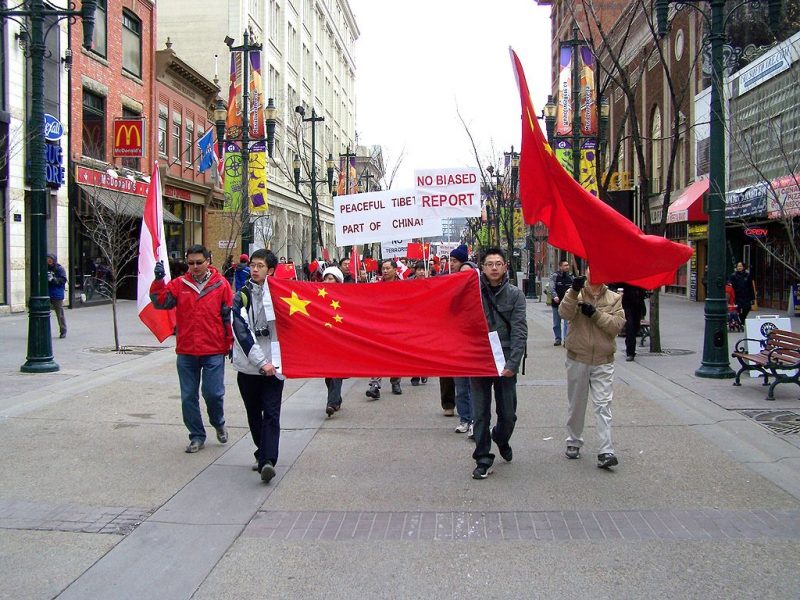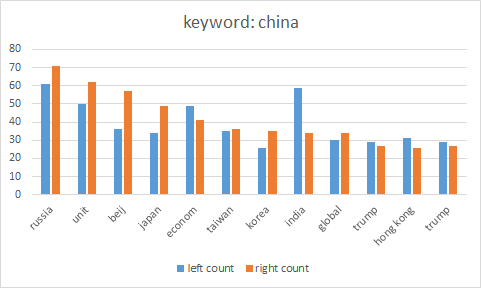
A pro-Chinese march in Calgary, Canada organised by Chinese nationals residing in Canada in response to “perceived Western media bias” in 2008. PHOTO: Robert Thivierge (CC BY-SA 2.0) via Wikimedia Commons.
By Pong Lai
China has asserted from time to time that Western media, especially the liberal ones, are biased against China. This topic has also been raised on question-and-answer platforms such as Quora. There, people are debating whether there is a bias, and those who believe there is are asking whether this has been done with malicious intent.
In order to support our investigation of these questions with some data, we used two online tools, Media Cloud and Google Trends, to analyse English news reports on China.
First of all, we examined China's claim that western media focus on their human rights issues and pollution and pay less attention to their economy. We used Media Cloud, an open source platform for tracking millions of stories published online, to generate a word cloud related to the query “China” between 2013/1/1 to 2017/1/1 from top U.S online news, which is based on comSORE, Activate and Alexa, and global English language sources, which is based on the ABYZ directory of English national online news sources. Together, the two sources comprise tens of thousands of English-language news outlets from all over the world.

Figure 1: Top words related to the keyword ‘china’ found by Media Cloud.
As shown in figure 1, “econom*” is the second most mentioned word related to the keyword “China”. The rest of the top words are about international relationships. The word “pollution” appears in 12 stories and is the 48th most mentioned keyword in the 1,000 stories examined. The word “protest” appears in only seven stories, and is the 118th most mentioned keyword. It is also noteworthy that the terms “human rights” or “rights” do not appear in the word cloud related to China, indicating that the topic is not represented in a significant number of stories from media outlets listed in top U.S online news in the ABYZ directory.
Although we do not know whether these stories about the economy in China are positive or negative, the results do not support the claim that Western media ignores economic growth in China and focuses instead on human rights and air pollution.
As China has complained that the United States still has a cold war mindset and use the media to attack their country, we compared three queries: “china AND econom*”, “china AND pollution”, and “china AND “human right”, from top U.S. online news and global English language sources. The number of articles yielded by these queries from these two sets of news sources, respectively, were 97,776 and 344,232 for “china AND econom”; 8,163 and 22,216 for “china AND pollution”, and 29,551 and 93,311 for “china AND human right”. The ratio of pollution news to economic news was 8% and 6%, and the ratio of human rights news to economic news was 30% and 27%, for top U.S. online news and global English language sources, correspondingly.
The results show that there is not much difference between top U.S. online news or global English language sources, and little proof to support the claim that U.S. media, compared to global English media, dwell on negative aspects of China and to use the media as a weapon to attack the country.

Figure 2: The number of stories with the keyword ‘china’ in the left-leaning and right-leaning news sources based on Media Cloud.
To examine the claim about “liberal media bias against China”, we compared results of Media Cloud queries from left-leaning and right-leaning news sources, defined by their relative number of tweets of U.S. election story URLs about Clinton (left to liberal) vs. Trump (right) in 2016.
As shown in Figure 2, the numbers of stories about China are similar for left-leaning and right-leaning news sources before 2014, but the right-leaning news sources increased gradually over time. The number of total reports in the period from 2013/1/1 to 2017/1/1 was 104,936 from left-leaning news sources and 188,843 from right-leaning news sources.

Figure 3: Top words related to the keyword ‘china’ in left-leaning and right-leaning news sources, based on Media Cloud.
Among the top ten words related to China (see figure 3), the right-leaning news sources have more stories on Russia, Japan, and Korea, and the left-leaning news sources have more stories on India, the economy, and Hong Kong. “Pollution” is listed in 29th place in the left-leaning news sources and in 46th place in the right-leaning news sources. “Protest” is listed in the 203rd place in the left-leaning news sources and in 51st place in the right-leaning news sources.
In summary, right-leaning news media published far more reports about China than the left-leaning news media, especially after 2014. Contrary to what has been suggested by China, left-leaning news sources reported more about China's economy, while right-leaning news resources reported more about protests. Comparatively, neither left-leaning nor right-leaning news media paid much attention to pollution or protests in China.







